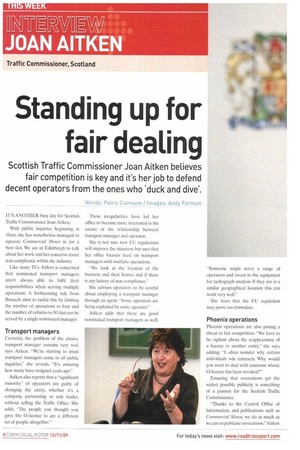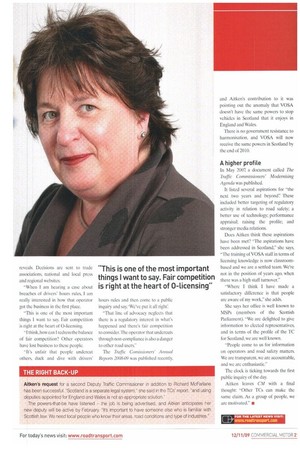Standing up for fair dealing
Page 20

Page 21

If you've noticed an error in this article please click here to report it so we can fix it.
Scottish Traffic Commissioner Joan Aitken believes fair competition is key and it's her job to defend decent operators from the ones who 'duck and dive'.
Words: Patric Cunnane Images: Andy Formar
IT'S ANOTHER busy day for Scottish Traffic Commissioner Joan Aitken.
With public inquiries beginning at 10am, she has nonetheless managed to squeeze Commercial Motor in for a 9am slot. We are in Edinburgh to talk about her work and her concerns about non-compliance within the industry.
Like many TCs. Aitken is concerned that nominated transport managers aren't always able to fulfil their responsibilities when serving multiple operations. A forthcoming rule from Brussels aims to tackle this by limiting the number of operations to four and the number of vehicles to 50 that can be served by a single nominated manager.
Transport managers
Certainly, the problem of the elusive transport manager remains very real, says Aitken. "Vv'e're starting to insist transport managers come to all public inquiries," she reveals. "It's amazing how many have resigned years ago."
Aitken also reports that a "significant minority" of operators are guilty of changing the entity, whether it's a company, partnership or sole trader, without telling the Traffic Office. She adds: "'Me people you thought you gave the 0-licence to are a different set of people altogether." These irregularities have led her office to become more interested in the nature of the relationship between transport manager and operator.
She is not sure new EU regulations will improve the situation, but says that her office focuses hard on transport managers with multiple operations
-We look at the location of the business and their homes and if there is any history of non-compliance."
She advises operators to be careful about employing a transport manager through an agent. "Some operators are being exploited by some agencies.
Aitken adds that there arc good nominated transport managers as well. "Someone might serve a range of operators and invest in the equipment for tachograph analysis If they are in a similar geographical location this can work very well."
She fears that the EU regulation may prove too formulaic.
Phoenix operations
Phoenix operations are also posing a threat to fair competition. "We have to be vigilant about the reappearance of a licence in another entity," she says, adding: "I often wonder why certain individuals win contracts. Why would you want to deal with someone whose 0-licence has been revoked?"
Ensuring that revocations get the widest possible publicity is something of a passion for the Scottish Traffic Commissioner.
"Thanks to the Central Office of Information, and publications such as Commercial Motor, we do as much as we can to publicise revocations," Aitken reveals. Decisions are sent to trade associations, national and local press and regional websites.
"When I am hearing a case about breaches of drivers' hours rules, I am really interested in how that operator got the business in the first place.
"This is one of the most important things I want to say. Fair competition is right at the heart of 0-licensing.
"I think, how can I redress the balance of fair competition? Other operators have lost business to these people.
"It's unfair that people undercut others, duck and dive with drivers' hours rules and then come to a public inquiry and say, 'We've put it all right: "That line of advocacy neglects that there is a regulatory interest in what's happened and there's fair competition to consider.The operator that undercuts through non-compliance is also a danger to other road users."
The Traffic Comissioners' Annual Reports 2008-09 was published recently, and Aitken's contribution to it was pointing out the anomaly that VOSA doesn't have the same powers to stop vehicles in Scotland that it enjoys in England and Wales.
There is no government resistance to harmonisation, and VOSA will now receive the same powers in Scotland by the end of 2010.
A higher profile
In May 2007, a document called The Traffic Commissioners' Modernising Agenda was published.
It listed several aspirations for "the next two years and beyond'? These included better targeting of regulatory activity in relation to road safety; a better use of technology; performance appraisal; raising the profile; and stronger media relations.
Does Aitken think these aspirations have been met? "The aspirations have been addressed in Scotland," she says, "The training of VOSA staff in terms of licensing knowledge is now classroombased and we are a settled team. We're not in the position of years ago, when there was a high staff turnover."
"Where I think I have made a satisfactory difference is that people are aware of my work," she adds.
She says her office is well known to MSPs (members of the Scottish Parliament). "We are delighted to give information to elected representatives, and in terms of the profile of the TC for Scotland. we are well known.
"People come to us for information on operators and road safety matters. We are transparent. we are accountable, and we are enthusiastic."
The clock is ticking towards the first public inquiry of the day.
Aitken leaves CM with a final thought: "Other TCs can make the same claim. As a group of people, we are motivated.•
















































































































































